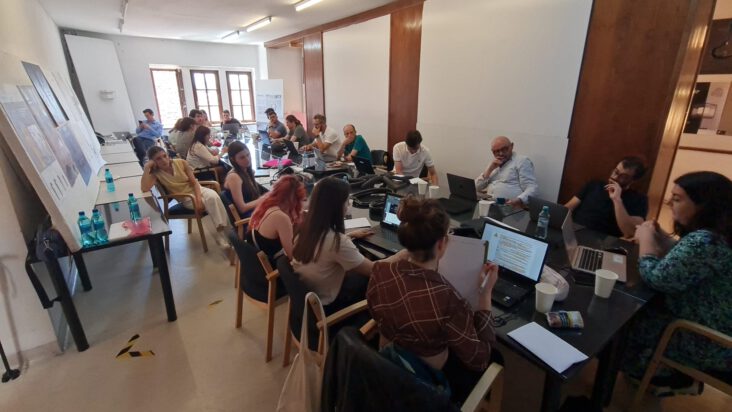University of Art and Design in Cluj-Napoca (UAD) News on the Final Project, as part of the Pilot Action within the framework of the Work Package nr. 5 (WP5) of the INTRIDE Project

Within the Pilot Action for the Postgraduate program nr. 1 “Design for Digital Transformation in the manufacturing sector” (PG1) , the University of Art and Design in Cluj-Napoca was assigned to organize teaching activities connected to the 3 modules of PG1:
Module 1: Design and sustainability (coordinated and provided by DIDA)
Module 2: Economics, business model and circular economy (coordinated and provided by WSB)
Module 3: Product and service design (coordinated and provided by ELISAVA).
The Final project in the pilot action was meant for creating an output of INTRIDE project consisting in the integration of INTRIDE key competences for a smart designer.
Another aim of the Final project was to get an output integrating the theoretical parts and the practical workshops provided within the 3 modules. UAD team planned the content of Final project, so its output could be a product, a service, a communication strategy, a system framework, etc.
The topic for the Final project was: A new experience of sitting and the company involved in the Final project activities was ANTARES, Cluj-Napoca, as member of the Transylvanian Furniture Cluster.
For assuring the conceptual link to the teaching content of the 3 modules, there were settled by the leader of WP5, ELISAVA, three checkpoints: in March 2022, in May 2022 and in June 2022, after the teaching activities and the final workshop of each module ended.
The teaching activities performed by representatives of UAD team of INTRIDE project within the days previewed for the checkpoints of each module had the following contents:
Checkpoint for Module 1 (21.03.2022 – 24.03.2022)
(main themes: globalization between authenticity and consumerism; improving reality with a critical, analytical and critical approach)
The general presentation of the Final project and a summary of all the key topics addressed by the teaching units of Module 1, including the final workshop of the module.
As the participants to the pilot action for PG1, students and staff members from the clusters participating in INTRIDE project, were divided in 4 groups, ANTARES company has chosen 4 types of chairs, so the participants could perform their task within the checkpoint of Module 1, consisting in
identifying 3 aspects that could be improved at the given chair for each group.
Starting from an existing product, participants were asked to find solutions for improving it by applying the knowledge acquired during the teaching units and the final workshop of Module 1.
Checkpoint for Module 2 (9.05.2022 – 11.05.2022)
(main theme: Sustainability and Eco-Design Research methods, understanding the ecological impact and its business value when designing a product)
The students attended the initial lecture, then they responded to the challenges regarding the topics of eco-design and business model for designing a product.
Checkpoint for Module 3 (14.06.2022 – 15.06.2022)
(main theme: The experience of materials)
The participants had to do research and assessment on how different materials (old & new / out of the box) are impacting the user experience and therefore affect the overall product design process and production.
During the week of the workshop of the Final project, 20.06.2022 – 24.06.2022, the participants visited the company ANTARES and received a complex presentation of the products of the company, visit which was essential for performing their tasks within the workshop planned for the Final project. After this visit, each group presented their research results obtained by fulfilling the tasks received during the checkpoints of the teaching modules of PG1. They carried-out their activities of the workshop under the supervision of UAD team and the representatives of the project coordinator and the project partners.
For the practical activities of the workshop, the participants had to improve the chair provided by the ANTARES company. The improvements were meant not only to be made directly to the physical product. The issues that were also addressed were marketing issues, communication, presentation, display, packaging, etc. By disassembling of the given chair, parts analysis & recyclability, the participants developed their projects with conclusions of the research and assessment of the versions (group projects).The collaboration and involvement of both the European partners and company partners, who played a key role in the development of the project, offered the participants the opportunity to meet and work together and to apply the knowledge and skills they acquired during the practical activities of the workshop. By fulfilling the requirement to redesign a chair model through considering the eco-design learnings and propose a new experience of sitting, the participants developed their final projects which were presented at the project meeting on 1st of July, 2022. The teams of the four groups received an outstanding feedback from company partners after presenting, not only the new chair concept they’ve developed, but also the in-depth research they did on eco-design systems, sustainable manufacturing and material options, and business implementation.
